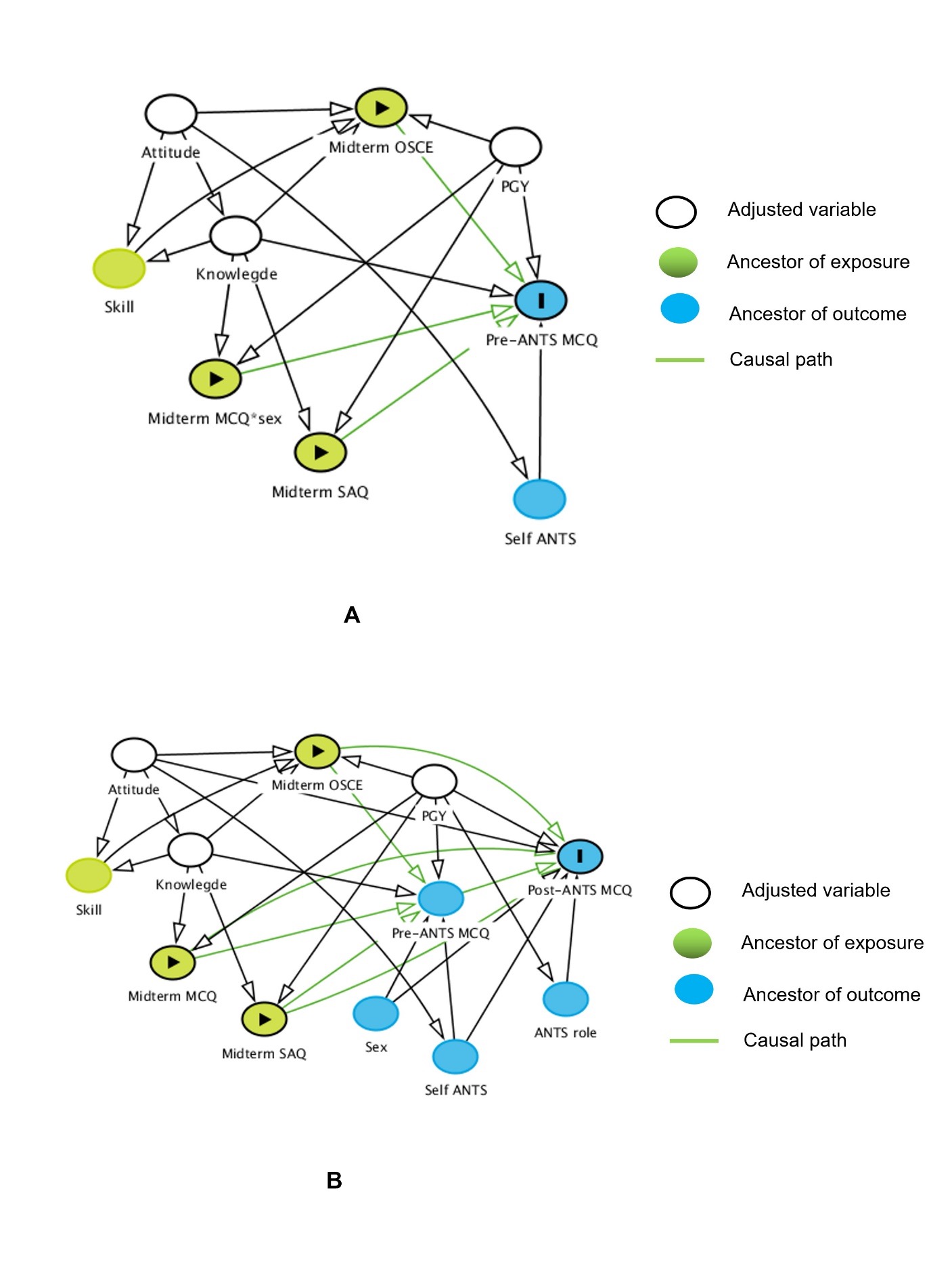Are Technical Skills Assessed Using Medical Knowledge Associated with Non-technical Skill Knowledge in Anaesthesia Resident Training?
DOI:
https://doi.org/10.33192/Smj.2022.99Keywords:
Technical skill, anaesthesia’s non-technical skill knowledge, multiple choice questions, short answer questions, objective structured clinical examinationAbstract
Objective: We examined the association between midterm examinations and anaesthetists’ non-technical skills (ANTS) knowledge using multiple choice questions (MCQs) for anaesthesia training.
Materials and Methods: A prospective cross-sectional study was implemented based on two cohort studies conducted in November 2017 and November 2019 at the university hospital in southern Thailand. Each cohort consisted of MCQs, short answer questions (SAQs), objective structured clinical examinations (OSCEs), and MCQs after ANTS simulation workshops during the midterm examinations. The main exposure variable was the midterm examination (MCQs/ SAQs/ OSCEs) whereas the ANTS MCQs were the outcome. The potential predictors were the residents’ role, sex, PGY (1-3), and competency. Associations between midterm examinations and ANTS MCQ scores were analysed using Pearson’s correlation coefficients (r) and multivariate linear regression analysis, and presented as beta coefficient (β) and 95% confidence limit (CL).
Results: Forty-eight anaesthesia residents were recruited for the study. After adjusting for PGY, knowledge score, and attitude evaluated by the staff, OSCE was found to be significantly associated with the pretest ANTS scores (β [95% CL]= 1.02 (0.06, 1.98)) and MCQ scores were significantly associated with the posttest ANTS scores (β [95% CL]= 0.14 (0.04, 0.24)). SAQ scores had negative associations with the pretest (β [95% CL]=-0.11 (-0.21, -0.01)) and posttest (β [95% CL]=-0.16 (-0.27, -0.05)) ANTS scores. It was found that there was a significant relationship between midterm examinations and posttest ANTS scores (r=0.52).
Conclusion: Technical skills using OSCE and midterm MCQ examination scores were associated with non-technical skill knowledge in anaesthesia training.
References
Flin R, Patey R. Non-technical skills for anaesthetists: developing and applying ANTS. Best Pract Res Clin Anaesthesiol 2011;25:215-27.
Fletcher G, Flin R, McGeorge P, Glavin R, Maran N, Patey R. Anaesthetists’ non-technical skills (ANTS): evaluation of a behavioural marker system. Br J Anaesth 2003;90:580-8.
Mete I, Brannick MT. Estimating the reliability of nontechnical skills in medical teams. J Surg Educ 2017;74:596-611.
Fletcher GC, McGeorge P, Flin RH, Glavin RJ, Maran NJ. The role of non-technical skills in anaesthesia: a review of current literature. Br J Anaesth 2002;88:418-29.
Riem N, Boet S, Bould MD, Tavares W, Naik VN. Do technical skills correlate with non-technical skills in crisis resource management: a simulation study. Br J Anaesth 2012;109:723-8.
Brunckhorst O, Shahid S, Aydin A, Khan S, McIlhenny C, Brewin J, et al. The relationship between technical and nontechnical skills within a simulation-based ureteroscopy training environment. J Surg Educ 2015;72:1039-44.
Oofuvong M, Pattaravit N, Kanjanawanichkul O, Siripruekpong S, Nuanjun K, Suwannarat B. Do different roles of anesthesia residents improve knowledge retention after non-technical skills workshop? J Med Assoc Thai 2021;104:1519-27.
Shrier I, Platt RW. Reducing bias through directed acyclic graphs. BMC Med Res Methodol 2008;8:70. doi: 10.1186/1471-2288-8-70.
Suttorp MM, Siegerink B, Jager KJ, Zoccali C, Dekker FW. Graphical presentation of confounding in directed acyclic graphs. Nephrol Dial Transplant 2015;30:1418-23.
Evidence scan: Complex adaptive systems. [homepage on the Internet]. The health Foundation [updated 2010 August; cited 2022 Jul 1]. Available from: http://www.health.org.uk/sites/default/files/ComplexAdaptiveSystems.pdf.
Pype P, Mertens F, Helewaut F, Krystallidou D. Healthcare teams as complex adaptive systems: understanding team behaviour through team members’ perception of interpersonal interaction. BMC Health Serv Res 2018;18:570. doi: 10.1186/s12913-018-3392-3.
Raksamani K, Jirativanont T, Sareenun P. Correlation of medical knowledge and non-technical skills assessment in anesthesia residents. Siriraj Med J 2020;72:483-7.
Gormley G. Summative OSCEs in undergraduate medical education. Ulster Med J 2011;80:127-32.
Shapiro JR, Klein SL, Morgan R. Stop ‘controlling’ forsex and gender in global healthresearch. BMJ Global Health 2021;6:e005714. doi:10.1136/bmjgh-2021-005714.
Groenwold RH, Klungel OH, Grobbee DE, Hoes AW. Selection of confounding variables should not be based on observed associations with exposure. Eur J Epidemiol 2011;26:589-93.
Farley JK. The multiple-choice test: writing the questions. Nurse Educ 1989;14:10-2, 39.
Salih KMA, Alshehri MAA, Elfaki OA. A comparison between students’ performance in multiple choice and modified essay questions in the MBBS pediatrics examination at the College of Medicine, King Khalid University, KSA. Journal of Education and Practice 2016;7:116-20.
Scully D. Constructing multiple-choice items to measure higher-order thinking practical assessment. Assessment, Research, and Evaluation [serial on the Internet]. 2017 May [cited 2022 Jul 5]; 22(4): [about 14 p.]. Available from:https://scholarworks.umass.edu/cgi/viewcontent.cgi?article=1355&context=pare
Farooqui F, Saeed N, Aaraj S, Sami MA, Amir M. A comparison between written assessment methods: multiple-choice and short answer questions in end-of-clerkship examinations for final year medical students. Cureus 2018;10:e3773. doi: 10.7759/cureus.3773.
Sathirareuangchai S. Iramaneerat C. Medical students’ and interns’ attitudes toward medical ethics education in a Thai medical school. Siriraj Med J 2016;68:97-103.

Published
How to Cite
Issue
Section
License

This work is licensed under a Creative Commons Attribution-NonCommercial-NoDerivatives 4.0 International License.
Authors who publish with this journal agree to the following conditions:
Copyright Transfer
In submitting a manuscript, the authors acknowledge that the work will become the copyrighted property of Siriraj Medical Journal upon publication.
License
Articles are licensed under a Creative Commons Attribution-NonCommercial-NoDerivatives 4.0 International License (CC BY-NC-ND 4.0). This license allows for the sharing of the work for non-commercial purposes with proper attribution to the authors and the journal. However, it does not permit modifications or the creation of derivative works.
Sharing and Access
Authors are encouraged to share their article on their personal or institutional websites and through other non-commercial platforms. Doing so can increase readership and citations.














